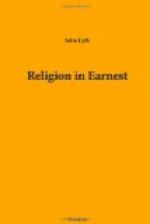“While alone at Mrs. T.’s, the Lord was graciously pleased to visit me with a manifestation of his love; increasing my faith, and applying these words with power to my mind; ’The word is nigh thee, even in thy mouth and in thy heart.’ I had such a view of the willingness of Christ to save by faith as I never had before. Notwithstanding, I think, if I had been better acquainted with the way of salvation, I should e’er now have been able to claim the blessing through the merits of Christ. But it is so simple I overlooked it; and thought myself wiser than I was. Now I begin to see with the Psalmist how ignorant I am, even ‘as a beast’ before the Lord; but blessed be His glorious name, I feel my confidence is in His mercy: yet I feel myself the most unprofitable of all His hands have made, and wonder why to me this boundless love.”
IV.
The holy estate.
“And they Twain shall be one flesh.” Matt. xix. 5.
Wedded life, perhaps more than any other, is a test of character; but when entered upon “reverently, discreetly, soberly, advisedly, and in the fear of God,” contributes in a higher degree not merely to earthly enjoyment, but to that which is the great end of life, human salvation. The constant action of two wills, thus intimately brought into contact with each other, must either inflame or mould the spirit, just in the degree in which it is subjected or not to the influence of divine grace; and where both parties are governed by Christian principle, the effect is mutual happiness and advantage. Nature is subdued, and grace brought into full play. The sorrows, difficulties, and temptations of life are lightened by reciprocal help and affection; the inheritance in heaven is pursued with greater zest because of united effort and encouragement; while the constant discharge of the respective duties of husband and wife serves for the development of the mind that was in Christ. Hence the Apostle Paul speaks of the marriage state as a great mystery, representing the union of Christ and his church. But marriage has reference to another and not less important object, the training of a “holy seed.” The union of parents is intended to secure blessings upon, their children, and where the divine requirement is prayerfully attended to, there may be expected to be a fulfilment of the gracious promise,—“I will pour my Spirit upon thy seed, and my blessing upon thine offspring.”
In the prospect of assuming the responsible relation of wife, Miss Burdsall thought and felt deeply. Her first anxiety was, that she might find in her husband one who would help her in the way to heaven; and the next that she might be able to discharge the duties of her new station with efficiency and fidelity. The predominating desire of her heart was to find her happiness in God, and to be conformed in all things to his will. Two days before marriage she writes:—




